Projects Funded in 2014-2015
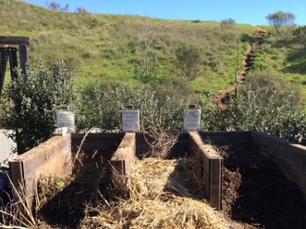
Increasing Compost Education
Allocated Funds: $3,159
Purpose: The Program in Community and Agroecology (PICA) is an educational community focused on sustainable agriculture and community building. PICA offers weekly and quarterly student-led workshops to teach students organic gardening and sustainable living skills. PICA's carbon fund grant will help support and expand their current compost education program. The project's goal is to increase education on campus about composting, as well as divert food waste from landfills. The funds will give PICA's compost coordinator the opportunity to offer compost education workshops and composting supplies, such as worm bins, to students. It is predicted that the program will reach over 170 students and divert 9,420 pounds of food waste from landfills.

Sustainable Commercial Export Packaging For Zero Motorcycles
Allocated Funds: $1,800
Purpose: Zero Motorcycles is a company that manufactures 100% electric motorcycles, however, they rely on non-compostable and non-recyclable materials to ship their products worldwide. The company currently uses shipping crates made of unsustainable materials, such as cardboard, plywood, and styrofoam. UCSC students and faculty members have partnered with Zero Motorcycles to develop a sustainable packaging solution for shipping their products. The project managers will use their funds to work with the company to research, design, and create a new crate model made of 100% sustainable materials. The project's goal is to present the company with a sustainable, feasible, and affordable redesign of the shipping crate that satisfies all physical requirements for shipping.

Walk to Class Challenge Day: Year 2
Allocated Funds: $2,800
Purpose: UCSC's Transportation and Parking Services (TAPS) provides and manages access and circulation to campus facilities. TAPS also oversees the planning, design, and operation of programs associated with on-campus transportation. In 2014, TAPS sponsored the highly successful Walk to Class Challenge Day, an educational event that promotes walking as a sustainable mode of transportation on campus. The event gathered over 400 students to conciously change their travel behaviors and walk to class. This year, TAPS has requested a carbon fund grant to make the second Walk to Class Challenge Day even more successful. The project managers will use their funds to sponsor interns and volunteers to market and create the second annual Walk to Class Challenge Day.
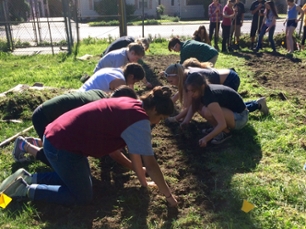
Santa Cruz High Garden Renaissance
Allocated Funds: $5,000
Purpose: A group of UCSC students, Santa Cruz High School students and teachers, and community members are beginning to convert a plot of degraded land near SC High School into a thriving organic garden. The team plans to transform the site into a beautiful garden and educational space for SC High School students. The garden will serve as a living classroom for students to develop and practice the technical skills of converting and tending to a garden site. The team will use their carbon fund grant to purchase necessary gardening supplies, such as a shed, seeds, worm bins, straw bales, rakes, forks, wheelbarrows, and fruit trees. The team estimates that planting and cultivating an organic orchard in the garden will sequester 250 pounds of CO2 per year.
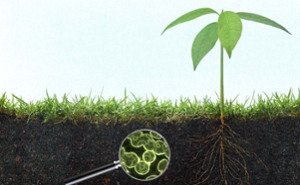
Development of a Versatile Microbial Fuel Cell
Allocated Funds: $400
Purpose: A team of bioengineering students have been awarded a carbon grant to engineer and construct a portable, versatile microbial fuel cell (MFC). A MFC is a bioelectrochemical system that generates electrical power by exploiting the biocatalytic reactions of microbial cells. Ultimately, the team plans to design a MFC that can be employed in aquatic sediment that can effectively make use of microorganisms already present within the environment. The project's goal is to engineer a MFC module versatile and portable enough to be used in any aquatic location and to prove that renewable energy can be harvested from soil.
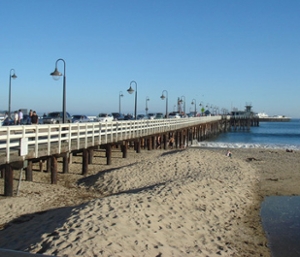
Green Field Trips to the Santa Cruz Wharf
Allocated Funds: $2,400
Purpose: The Santa Cruz Wharf Outreach Network was awarded a carbon fund grant to run a pilot project for their field trips to the Santa Cruz wharf program. The goal of the project is to determine the feasibility of offering school field trips, where students learn about topics in sustainability, to the Santa Cruz Wharf. The pilot project will run for one year and provide 1-2 field trips a month. The project manager also plans to work with the Metro Transit District to pilot the field trip program. The team's carbon fund grant will be used to work with the Metro and fund public transportation for the field trips. The team estimates that providing the schools with public transportation to the wharf will save 46 gallons of gasoline a year.
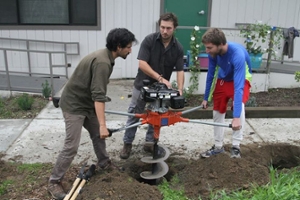
Digging Deeper in the Harbor High Grow Quad
Allocated Funds: $1,000
Purpose: A team of UCSC students have been awarded a Carbon Fund grant to further develop the Harbor High Grow Quad. The HHGQ is a 1/10th acre edible forest commons in a major in a major stage of growth following an extremely successful first year. The space also serves as a demonstrative training center in sustainable food production, a living classroom for school programs, a model community-driven school garden program, and a natural gathering place. The team will use their Carbon Fund grant to purchase the neccessary items for transforming the space even more. The team intends to plant around 30 fruit trees, which will produce 6,000 pounds of fruit annually.
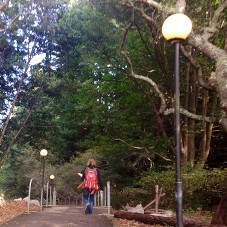
Pathway Lighting Retrofit
Allocated Funds: $27,3000
Purpose: The UCSC PowerSave team is using their carbon fund grant to replace existing High Pressure Sodium (HPS) light bulbs on campus with more efficient LED bulbs. The team piloted the program in 2014, and will now be working towards completely replacing the bulbs. They will also analyze data from before and after the replacement to determine energy savings this year. This project will save an immense amount energy and directly reduce our campus' carbon footprint. It is estimated that the project will save 422.25 tons of CO2 and 1,774,170 kWh of electricity over its lifetime.
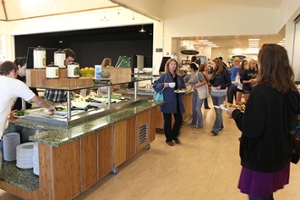
Water and Energy Efficient Steamer Cookers in Campus Dining Halls
Allocated Funds: $13,503
Purpose:. A group of UCSC students were awarded a carbon fund grant to install two energy and water efficient steamer cookers in the Cowell/Stevenson and 9/10 dining halls. The team will also work closely with the dining hall staff to closely monitor and collect data from the new equipment. It is estimated that the implementation of this project will save 303,876 gallons of water and 9,649 therms of energy annually, resulting in annual utility cost savings of $12,924 for Dining Services and an annual reduction of 52.41 tons of CO2e.
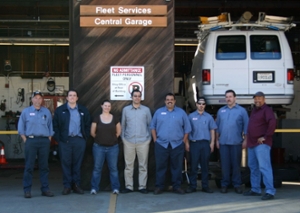
Fleet Services Electric Vehicle Upgrade Project
Allocated Funds: $6,430
Purpose: This project's goal is to upgrade a fleet of 10 Neighborhood Electric Vehicles (NEV) to avert the purchase Internal Combustion Engine (ICE) trucks on campus. The upgrade includes replacing toxic, lead-acid batteries with Lithium ion batteries, which are safer and and more efficient.
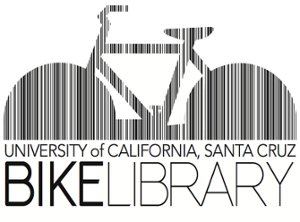
The UCSC Bike Library
Allocated Funds: $13,537.50
Purpose: The Bike Library increases bike ridership, safety, and awareness on campus by making bikes accessible to students, staff, and faculty. Funds will help the library purchase more bikes and hold classes, which will expand the program.
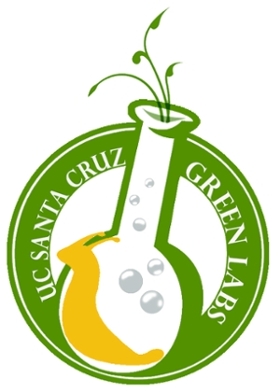
Green Labs Equipment Retrofit
Allocated Funds: $13,000
Purpose: This project's goal is to increase the incentive for campus labs to upgrade existing equipment with energy efficient equipment. The team has accumulated a list of My Green Lab- recommended lab equipment that the funds can cover.
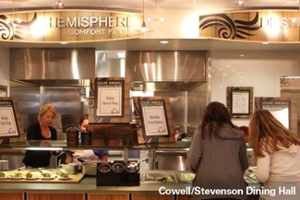
Cowell/Stevenson Dining Hall: Water & Energy-Efficient Dish Machine Replacement
Allocated Funds: $30,000
Purpose: The Carbon Fund awarded money to incentivize the purchase and use of a water and energy-efficient dish machine for the Cowell/Stevenson dining hall. This machine will generate massive energy and water savings
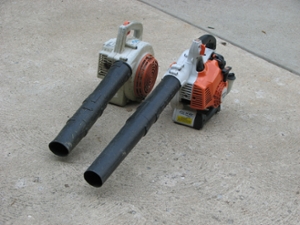
Reducing GHG Emissions by Greatly Reducing 2-Stroke Leaf Blower Use on Campus
Allocated Fuds: $11,325
Purpose: This project intends to replace 2-stroke leaf blowers with battery powered ones. This replacement will eliminate one ton of carbon monoxide emissions and various other pollutants
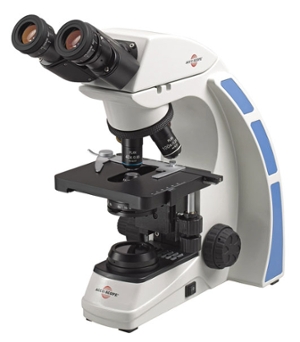
Microscopy Facility LED Light Source Upgrade
Allocated Funds: $13,748
Purpose: The project's goal is to replace microscope lights in the UCSC microscopy facility. The switch from mercury bulbs to LED will generate energy savings while eliminating the use of toxic- containing bulbs.
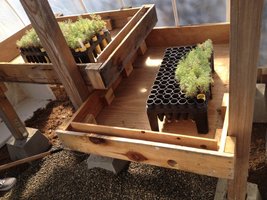
Arboretum Bioponics
Funds Allocated: $10,000
Purpose: This project team will build a closed-loop bioponics system at the UCSC arboretum. By growing plants without soil, the system will produce food as well as educate students and promote research.

Ecotopia House
Funds Allocated: $2,000
Purpose: This student-run project involves constructing a small, sustainable home that will be exhibited at UCSC, and showcased at a competition in Sacramento.
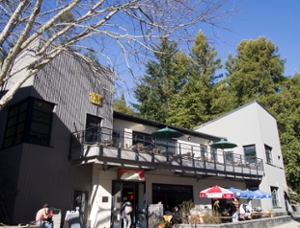
Graduate Student Commons Commercial Kitchen Retrofit
Allocated Funds: $25,000
Purpose: This project aims to replace outdated kitchen equipment at Joe's Pizza and Subs. The team will work on replacing energy intensive equipment with energy efficient options before a new venfor moves into the kitchen in September of 2015.
